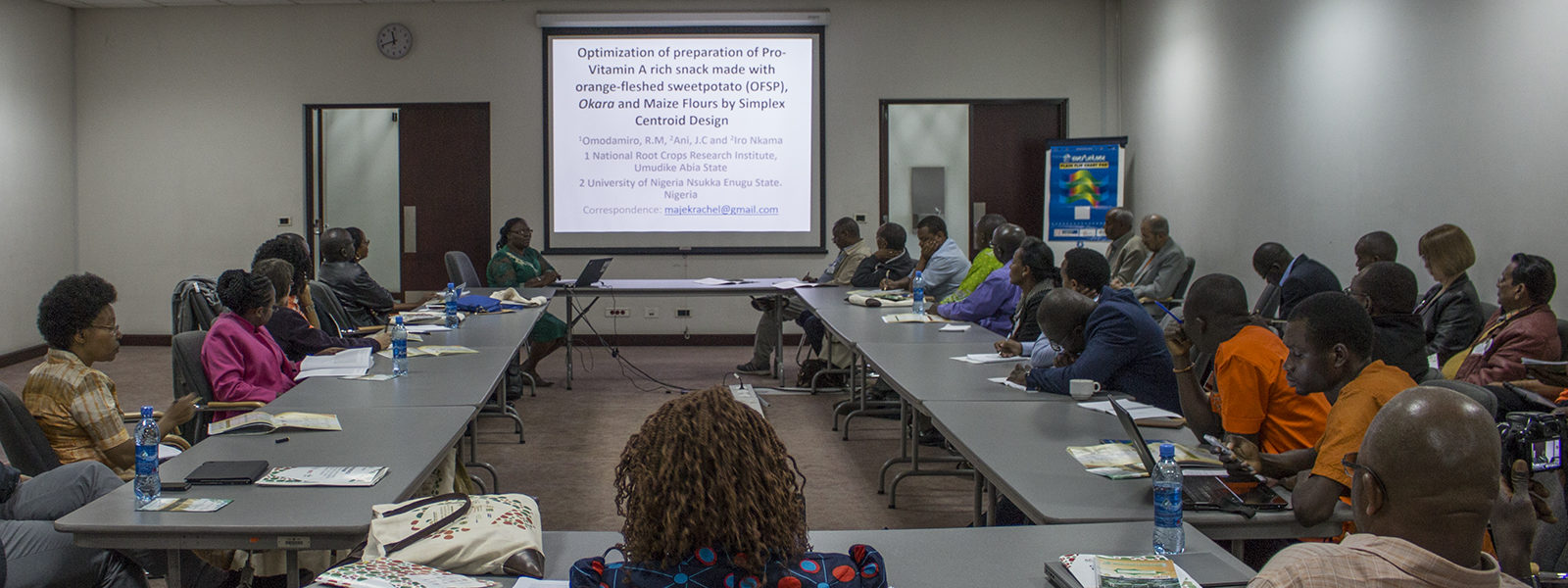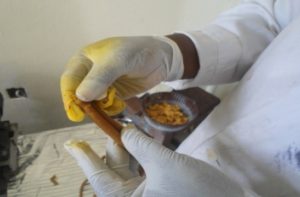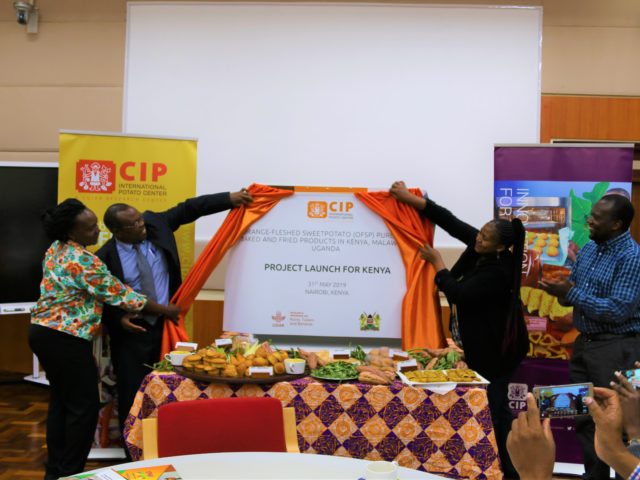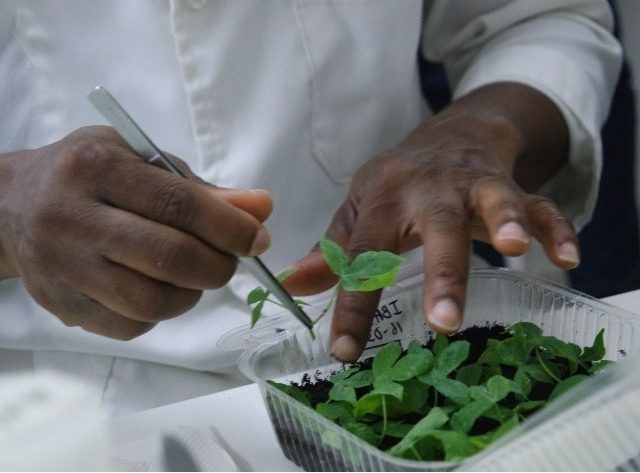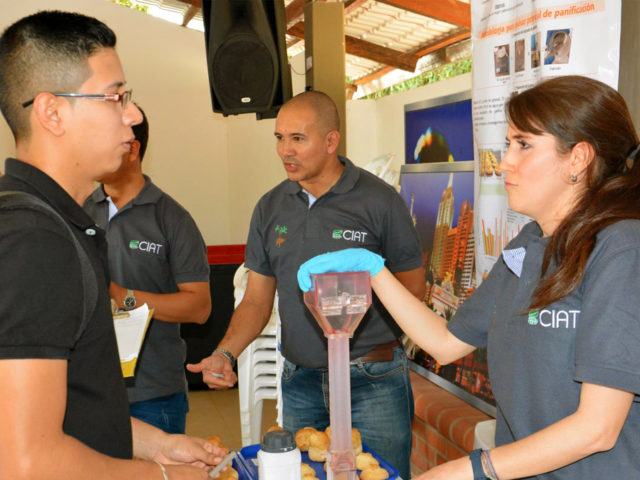The 10th Triennial African Potato Association Conference (October 9 – 13, 2016) brought together over 200 researchers, development practitioners, policy makers and more to exchange knowledge and experiences from their work with potato and sweetpotato – including young African scientists and innovative farmers who received scholarships to attend the event.
Through its sponsorship of the conference, the CGIAR Research Program on Roots, Tubers and Bananas (RTB) was proud to award scholarships to seven promising African scientists including Dr. Rachel Omodamiro from the National Root Crops Research Institute (NRCRI) of Nigeria, who presented her work on the topic of ‘Optimization of preparation of pro-vitamin A rich snack made with orange-fleshed sweetpotato, okara and maize flours by simplex centroid design’.
“As a research scientist attached to a Product Development Programme in my home institution, NRCRI in Umudike, Nigeria, I made a pro-vitamin A rich beverage from orange-fleshed sweetpotato (OFSP) and I had some waste as by-product from this. So I went further and researched how to utilize the waste meal so as to fully utilize the OFSP,” explains Rachel.
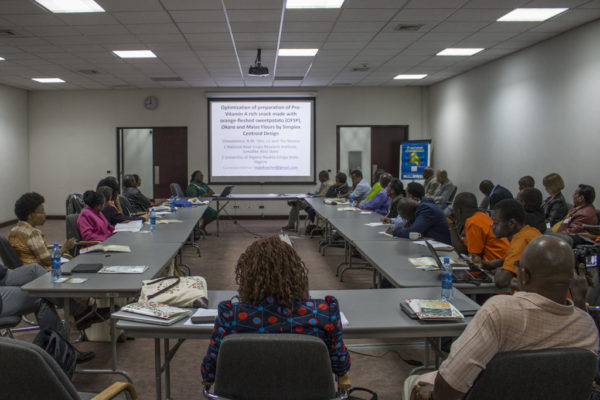
Rachel (center front) presents her findings during a session of the APA conference. Photo H.Holmes/RTB
Rachel and her team took the waste flour from the OFSP beverage processing and combined this with okara, another flour that is the by-product of soy milk production, and white maize meal. The optimum ratio of the flours was established, then mixed and extruded using a single screw extruder at a constant temperature of 80°C, resulting in a nutritious ready-to-eat snack.
The chemical composition of the snack was evaluated to determine its nutritional content, finding that it had a total carotene retention of 94.95% based on the total carotenoid content of the OFSP waste meal.
The final product was then presented to a 20-member panel for sensory testing for traits including taste, texture and aroma – receiving a rating of 8.17 on a 9-point Hedonic scale.
Based on the product’s high rating and nutritional value, Rachel is optimistic that it could play a key role in helping to reduce vitamin-A deficiency, particularly among children. In sub-Saharan Africa and Asia, vitamin A deficiency is the leading cause of blindness, disease and premature death among children under five years of age.
“Snack eating is an integral part of the human diet that cuts across all ages, so the intended market for this product is everyone and especially children. A healthy snack such as this pro-vitamin A rich product will be more applicable to children as they need nutrients for their growth and development,” says Rachel, who explained that alongside vitamin A, the snack includes important minerals – calcium, iron, magnesium and zinc.
It could also help to provide a source of income for both small- and commercial-scale OFSP processors in Nigeria, and reduce environmental waste through its use of by-products.
“The research is a great innovative novel finding in that it utilizes edible agro wastes that could pose environmental challenges, and provides value addition to OFSP and soy milk production,” says Rachel.
“I hope to complete patency procedure of the research findings and then link up with more commercial enterprises for mass production to maximize the utilization of OFSP and contribute to the fight against vitamin-A deficiency. My institute is engaged in training rural populace on root crops value-addition. I hope to be able to conduct research on the use of a locally fabricated extruder and produce a training leaflet that could be used to train youth and rural small-scale food processors,” she adds.
Along with providing an opportunity to share her research findings with the scientific community, the conference was also a platform to seek potential funding to help bring her product to the wider population through consumer acceptance tests and packaging development.
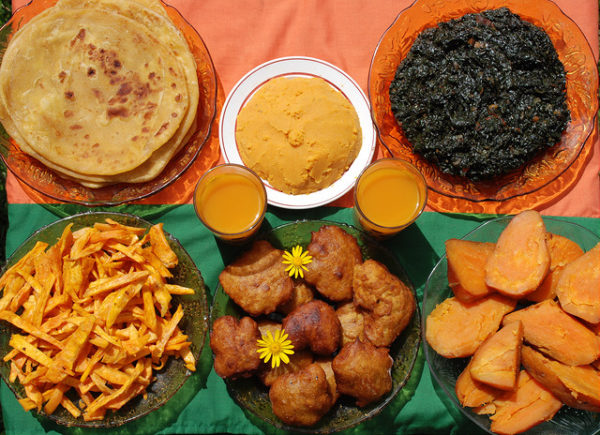
OFSP can be processed in to a variety of foods, including OFSP beverages as shown here. Photo S.Quinn/CIP
“The most valuable part of attending the APA conference for me was the ability to present my research findings, which was well appreciated by my audience, as well as opportunity to meet with other research scientists, which increased my network,” she notes.
Rachel’s work aligns strongly with RTB’s Flagship Project 4 (FP4) on ‘Nutritious RTB Foods and Value Added Through Post-Harvest Innovation’, which aims to support the fuller, equitable, and sustainable utilization of root, tuber and banana crops for healthier diets and improved income opportunities.
“This is just the kind of work FP4 wants to support as we look for ways to open up OFSP as a nutritious food to a broader urban market and add value. Developing and promoting healthier alternatives to existing snack foods is an important part of this, especially when accompanied by consumer education on healthier diets. We believe that this can build sustainable market demand for nutritious RTB crops like OFSP among young urban consumers,” says Dr. Simon Heck, Flagship Project Leader for FP4 and Program Leader with the International Potato Center.
For more information on the research reported in this article, please contact: majekrachel@gmail.com
